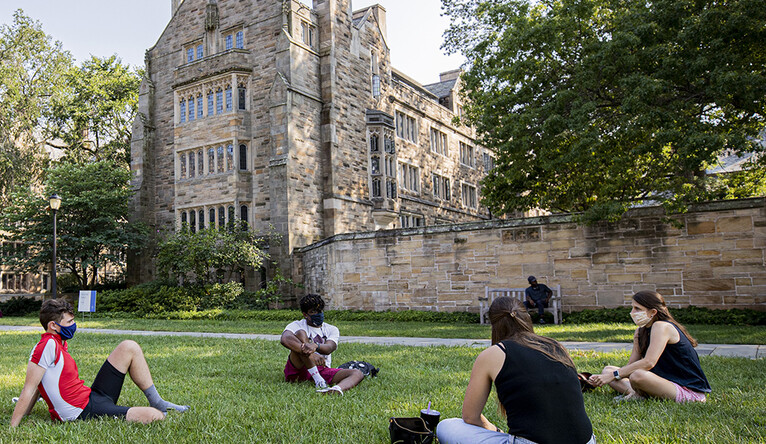
YaleNews
Although the few in-person classes offered at Yale may have provided the only relief for rampant cases of Zoom fatigue, the inherent challenges of holding these classes during a pandemic made them a challenge in their own right for both students and professors.
Most Yale courses have had no in-person components since the abrupt shift to online learning that occurred during the 2020 spring semester. In-person classes during the fall 2020 semester were mostly limited to science, technology, engineering and math lab courses, as well as some courses that were created to allow for first-year international students to be granted a visa in accordance with a new Department of Homeland Security policy. The spring 2021 semester introduced additional in-person courses, including some humanities courses, but there were still only 51 courses registered for in-person instruction during this semester. All of these courses had to adhere to stringent social distancing guidelines.
Edward Wittenstein, a lecturer at the Jackson Institute of Global Affairs, detailed new policies in an email to the News for his course, “Cybersecurity, Cyberwar, and International Relations.”
“It is a much larger classroom than normal, with everyone socially distanced, wearing masks, and closely following all Yale health procedures — plus a lot of wires, microphones, video cameras, and screens,” Wittenstein wrote. “However, these necessary inconveniences are a small price to pay given our desire for in-person interaction, to the extent circumstances permit.”
Lab classes required some more extensive modifications. Lecturer Aruna Pawashe stressed the importance of physical modifications to her biochemistry lab. She mentioned that Yale had installed clear plastic dividers between student’s workspaces. Pawashe also explained that she added an optional 10-minute meditation session at the beginning of her lab classes. This was enacted to improve students’ mental health, in accordance with a Yale study.
Other instructors described modifications to their course material. Lecturer Iain Dawson, who teaches a genetics lab, described new measures to minimize student-to-student contact. He also told the News that many lab instructors have cut out some parts of experiments to reduce the time spent in the lab.
Many instructors and students alike felt these measures were sufficient. Pericles Lewis, Douglas Tracy Smith professor of comparative literature, told the News that he felt “perfectly safe” teaching “Purposes of College Education,” an in-person course. Likewise, Shan Gunasekera ’24, a student enrolled in this course, remarked that he felt “really comfortable.”
Gunasekera noted that the in-person component of the class “gave [him] a sense of what Yale really was.” Bradley Nowacek ’23 echoed this belief, remarking that his in-person theater performance provided a “regular, dependable source of in-person contact.”
“Of all the times to take this course, this is probably the worst,” Nowacek told the News, expressing the difficulties of theater class with a mask on. “But having a course like this is really valuable to add into my schedule at this specific moment.”
Although professors sympathized with students’ desires for in-person classes, public safety concerns generally prevailed. In September, an in-person lecture with a visiting professor caused three students to test positive for COVID-19, serving as a chilling reminder of the dangers of in-person interactions.
Director of Undergraduate Studies of Anthropology William Honeychurch had originally planned to hold an in-person class, but decided to switch to online instruction after learning about the emergence of new COVID-19 variants. Although he acknowledged that his course could not be fully experienced online, he maintained that his decision was “the best practice given the situation.”
The emergence of the vaccine has largely addressed these concerns. Accordingly, University President Peter Salovey and University Provost Scott Strobel have announced that almost all courses, with the exception of some large lectures, will be held in person.
“We are excited to consider all that we have learned over the past 12 months and plan a safe and fulfilling new academic year,” Salovey and Strobel wrote in an email to the Yale community.
Classes will begin for the fall 2021 semester on Sept. 1.
Sean Pergola | sean.pergola@yale.edu







